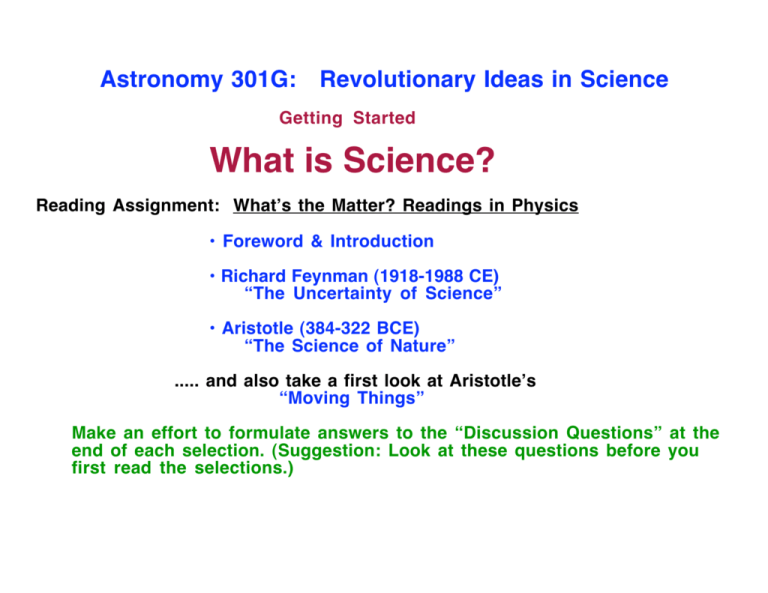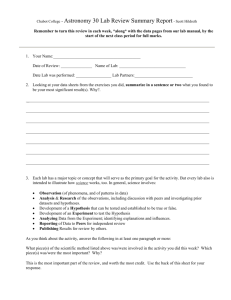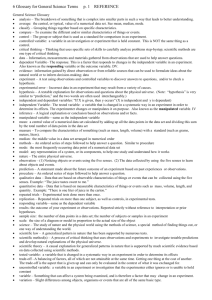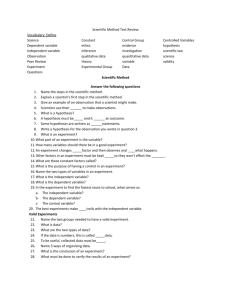A301G What is Science?
advertisement

Astronomy 301G: Revolutionary Ideas in Science Getting Started What is Science? Reading Assignment: What’s the Matter? Readings in Physics • Foreword & Introduction • Richard Feynman (1918-1988 CE) “The Uncertainty of Science” • Aristotle (384-322 BCE) “The Science of Nature” ..... and also take a first look at Aristotle’s “Moving Things” Make an effort to formulate answers to the “Discussion Questions” at the end of each selection. (Suggestion: Look at these questions before you first read the selections.) What is Science? Science is the systematic study of the physical world. Qualification: “Science” = “Natural Science” Science is based upon observations of that world. Science is empirical and progressive. It involves the formulation and testing of hypotheses. Science attempts to explain natural phenomena. Goals and Objectives To gather information through observation and experiment To organize and systematize that knowledge To infer the the “laws of nature” which govern natural events The Domain of Science Physical Reality Science deals only with physical (“real”) objects and events, those which are either directly observable or whose existence can be inferred indirectly from observations. Observations must generally be reproducible (“witnessable”) to be considered real. (cf. ghosts, hallucinations, beliefs, ....) Note: Single (past) non-reproducible events or observations can sometimes be accepted as “real” if supported by a suitably large body of evidence. Factual Knowledge (“Data”) Information whose accuracy has been confirmed again and again by repeated observation or experiment. This “Information” can include fundamental principles, testable hypotheses, as well as directly observed events, processes and connections. The Working Assumptions of Science The Universe is Causal: Natural phenomena have natural causes which precede them. (No magic!) The Universe is Rational: Identical causes produce identical effects under identical conditions. (The rules don’t change in the middle of the game!) The Universe is Understandable: The laws of nature can, in principle, be deduced from observations of nature. (There are rules: Nature is not unreasonably complex!) Note that these assumptions are themselves testable! The hypothesis that the physical universe is causal, rational, and (at least in principle) understandable, is perhaps the most “revolutionary” idea of science. Digression: Fields of Science The Natural Sciences The Physical Sciences: Physics, Chemistry, Astronomy, Geology, .... The Biological Sciences: Biology, Botany, Zoology, Ecology, .... Hybrids and Sub fields: Astrobiology, Biochemistry, Astrophysics, Nuclear Physics, Cosmology, Organic Chemistry, ... The Formal Sciences Logical structures based on a priori rather than empirical methods. Mathematics & Logic Arithmetic, Geometry, Trigonometry, Calculus, ... Statistics, Group Theory, Topology, ... Advances in the “Formal Sciences” have often led to significant advances in the Natural Sciences - or were motivated by needs of the Natural Sciences. The Social Sciences also Human (Individual) Behavior: Psychology, ... Social (Group) Behavior: Sociology, Ethnology, Economics, ... The Methodology of Science What is the “Scientific Method”? The Scientific Method is procedure for obtaining consistent and unbiased explanations for events observed in nature. A scientific explanation (generally expressed as a theory or model) will be reproducible and predictive. If properly applied, the Scientific Method produces results (in the form of hypotheses, models, theories, or laws) which are: • Objective • Unbiased • Transcultural (like Mathematics) As a methodology for approaching, describing, and understanding the universe the Scientific Method has been repeatedly shown to work. The Scientific Method Application of the Scientific Method involves four steps: 1. Observation One begins with observations of some phenomenon of the physical universe. (Phenomenon: A set of events, facts, processes, interactions, associations, ...) 2. Hypothesis Formulate a tentative explanation of the observations. This will usually be in the form of a causal mechanism, often expressed as mathematical relations. 3. Prediction The hypothesis is used as the basis for predicting new phenomena or for phenomena other than those used in formulating the original hypothesis. 4. Testing The predictions are tested by experiments or further observations. If the results agree with the predictions the hypothesis survives as a “working hypothesis” or “theory”. If not, the hypothesis must be modified or rejected. The initial hypothesis could be modified as result of the prediction and testing process. The last two steps might then be repeated to see if the modifications result in better agreement between prediction and the observations. OBSERVATION • Define Area of Inquiry (importance of defining terms and units) • Facts or phenomena observed • Identification & description • Classification: Typing • Quantification & Measurement: Instruments • Connections & Associations • Estimation of Errors and Uncertainties HYPOTHESIS • Generalization • Explanation: Mechanisms • Extensions: Predictions • Consistency requirements • Limitations: Area or conditions of applicability. (low speed, low gravity,...) TESTING • Requirements of a Scientific Theory Consistency with the (known) laws of nature (no special pleading) Consistency with existing observations Explanatory power (it adds to our understanding of nature) Predictive Power: Usefulness Falsifiability! (it is useful) • Testing & Outcomes (it still works): Experimental Design, Errors, etc. If it isn’t testable (“falsifiable”) it isn’t a scientific theory. As long as it works (meets above criteria) it remains a viable theory The Hierarchy of Scientific Knowledge 1. Speculation A vaguely formed idea or guess usually based upon limited observational material. 2. Hypothesis A tentative explanation of a phenomenon or group of observations or a proposed causal mechanism relating phenomena. Scientific hypotheses are often expressed as mathematical relations between observable quantities (“Mathematical Models”). A valid scientific hypothesis must have predictive value which render it falsifiable. 3. Theory A theory is basically an hypothesis which not only succeeds in explaining some phenomena but all of whose predictions been adequately confirmed (when possible) by means of additional observations or experiments. A theory is a successful working hypothesis with remaining predictive power. 4. Law A scientific theory with broad predictive power (‘usefulness”) and an extensive history of successful testing might be elevated to the status of of a Scientific Law, particularly if it forms the basis for explaining a wide range of phenomena. “But It’s Only a Theory ......” Implication: There is no particularly strong reason for believing its statements are true, its explanations valid, or its predictions to be taken seriously. Circumstances: Usually from a source who disagrees with the implications of the theory on social, political, theological, or “inertial” grounds. Note that this criticism is almost never raised against a theory unless it is perceived as a threat to existing beliefs, intuitions, or behavioral patterns. How do you choose? cf. William of Ockham • Scientific Ideas Hierarchy: Speculation, Hypothesis, Theory, or Law? Breadth of application • Desiderata: Simplicity, Applicability Unless it’s also a fact- in which case is true? Is it testable or observable? Discussion: Is it a Science? What fields of human endeavor meet the definition of being “scientific”? What fields do not? Speculation, Hypothesis, Theory, Law Law as a direct consequence of observation (Kepler) Alchemy/Chemistry & Astrology/Astronomy Digression: Buzzwords: Paradigm Shift, Reductionism, Is it a Science? Does it have a factual (observational) basis? Does it address a real physical phenomena? Is the observational evidence for these phenomena convincing? Consider the source. Is it second hand or anecdotal? Does it offer logical and causal explanations for these phenomena? Are its theories and models consistent with the known laws of nature? Are its models consistent with other observations? Do its theories or models have predictive value? Do they work? Are its theories falsifiable?









